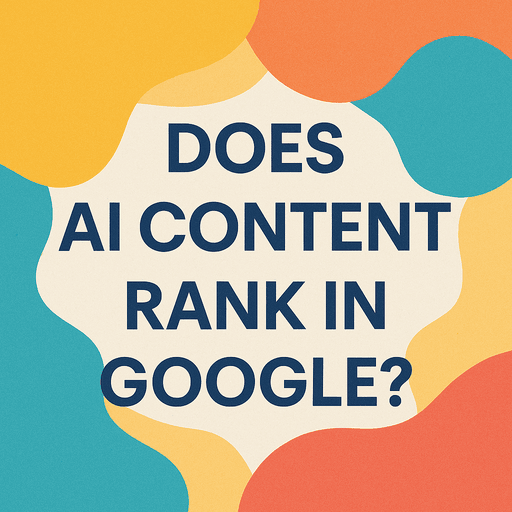Does AI Content Rank in Google?

Short Answer: Yes, AI content can rank in Google if it’s helpful, accurate, and written with expertise. Google doesn’t penalize AI writing by default, but it does demote low-value or mass-generated content that lacks originality or effort.
Introduction
Many marketers wonder whether Google will reward or reject AI-written articles. Some fear automatic penalties, while others use AI to scale their content strategy. The truth lies in the quality, not the author. Google has stated that it evaluates helpfulness and trustworthiness, not whether a human or AI wrote the text.
In this post, we’ll break down what Google, Semrush, Ahrefs, and Search Engine Land have revealed about AI content rankings and how to make your AI-assisted writing perform like an expert-authored post.
Google’s Official Stance on AI Content
Google doesn’t penalize AI writing outright
According to Ahrefs’ study on AI-generated content, Google clearly stated that it is not against AI content. What matters is whether the page is useful, original, and accurate, not how it was written.
Quality raters focus on effort and originality
Google’s 2025 Search Quality Rater Guidelines update instructs reviewers to flag content that shows little to no effort, originality, or added value. Pages that look mass-produced can receive a Lowest quality rating. That’s a quality issue, not a technology issue.
AI detection is unreliable, even for Google
Many assume Google can automatically tell if something was AI-written. It can’t. As I explained in my LinkedIn article on the flaws of AI detection tools, every detector on the market is inaccurate, including those used by large platforms. Even Google can only guess based on linguistic patterns and perceived effort. It cannot determine with certainty whether content was AI-generated.
The takeaway: what matters is quality and usefulness, not origin.
What the Data Says: Semrush and Ahrefs Findings
Semrush analyzed 20,000 blog posts
In Semrush's study of 20,000 articles:
-
57% of AI-detected content appeared in Google’s top 10 results, compared with 58% of human-written articles.
-
39% of marketers saw higher organic traffic after adding AI-assisted workflows.
-
73% said the best-performing content combined AI drafting with human editing.
-
Only 5% relied on AI alone.
Semrush concluded that AI content can rank as well as human writing when it’s fact-checked, optimized, and enhanced with genuine insight.
Ahrefs studied 600,000 pages
In a massive Ahrefs analysis of 600,000 pages, researchers found no meaningful link between AI content and poor performance:
-
The correlation between AI use and ranking position was just 0.011, essentially zero.
-
Pure AI pages rarely hit number one, but mixed human-AI content ranked comparably to fully human pieces.
Their conclusion: Google doesn’t care how content is written, only that it’s helpful, high quality, and satisfies search intent.
Google’s quality rater updates confirm the pattern
Search Engine Land’s coverage of the 2025 rater update emphasized that low-effort AI content is treated the same as any other low-quality text. Human oversight, expertise, and verification remain the deciding factors.
Why Some AI Content Doesn’t Rank
Even though AI content can rank, many articles fail because they’re:
-
Rewritten summaries of existing sources with no new insight
-
Poorly formatted or unedited for flow and clarity
-
Overstuffed with keywords but missing search intent
-
Factually inaccurate or lacking credible citations
-
Missing E-E-A-T signals such as experience, expertise, authority, and trust
-
Low-effort or repetitive, what raters now label as Lowest quality content
The problem isn’t AI. It’s unreviewed, uninspired output.
How to Make AI-Assisted Content Rank in Google
-
Start with human keyword and intent research: Understand what users want before generating anything.
-
Use AI as a drafting assistant: Let AI outline or summarize, but ensure a human edits, restructures, and verifies every section.
-
Add first-hand expertise: Incorporate examples, case studies, or personal experience to build credibility.
-
Cite data and trustworthy sources: Link to verifiable studies like Semrush’s ranking analysis or Ahrefs’ AI content study.
-
Polish for SEO and readability: Use short paragraphs, clear headers, meta descriptions, schema markup, and natural internal linking.
-
Blend AI and human editing: The best-performing pages use hybrid workflows. According to Semrush, 73% of marketers mix AI generation with human refinement.
-
Monitor results: Track performance in Google Search Console, then iterate on what drives clicks and engagement.
For deeper optimization strategies, check out How to Optimize Content for AI Fact-Coverage.
FAQs
Does Google penalize AI content?
No. Studies from Ahrefs and Semrush found no penalty for responsibly used AI writing.
Can ChatGPT articles rank in Google?
Yes, as long as they’re edited, fact-checked, and optimized.
Should I disclose that AI helped create my content?
It’s optional. Transparency builds trust, but disclosure isn’t required by Google.
How accurate are AI detection tools?
Not very. As explained in my LinkedIn article on AI detection accuracy, no detector, not even Google’s internal systems, can confirm AI authorship with 100 percent certainty.
Why do some AI pieces still fail to rank?
They often lack originality, depth, or human editing, all core elements of Google’s quality standards.
AI Content Ranks When It’s Worth Reading
AI content can absolutely rank in Google, but quality determines whether it deserves to. Studies from Semrush, Ahrefs, and Search Engine Land all point to the same truth: Google rewards expertise and value, not authorship method.
Even AI detection technology can’t definitively label what’s human versus machine. It can only make educated guesses based on writing quality.
If you create helpful, fact-covered content enhanced by human insight, AI becomes an advantage, not a risk.
Contact me to build a content strategy that blends AI efficiency with human expertise.

0 Comments Add a Comment?